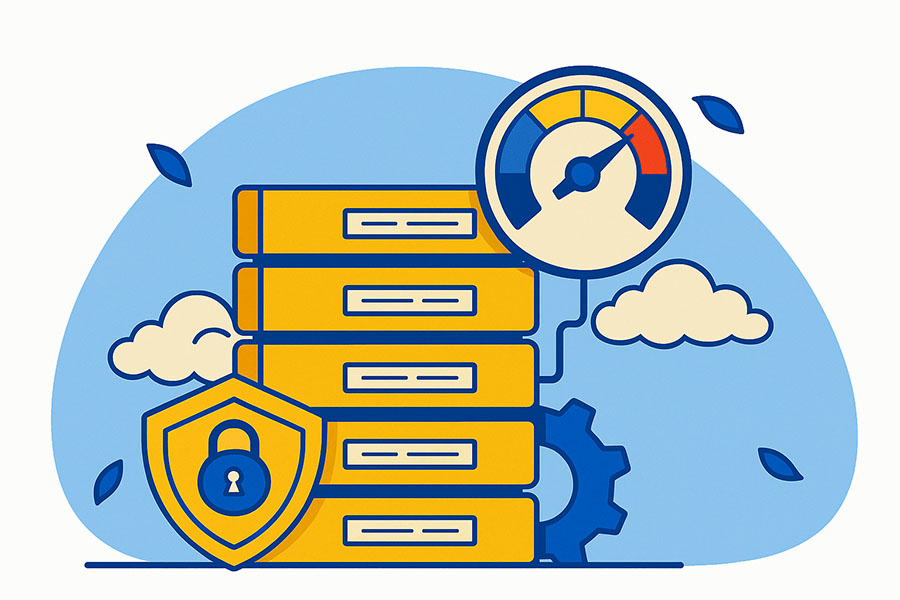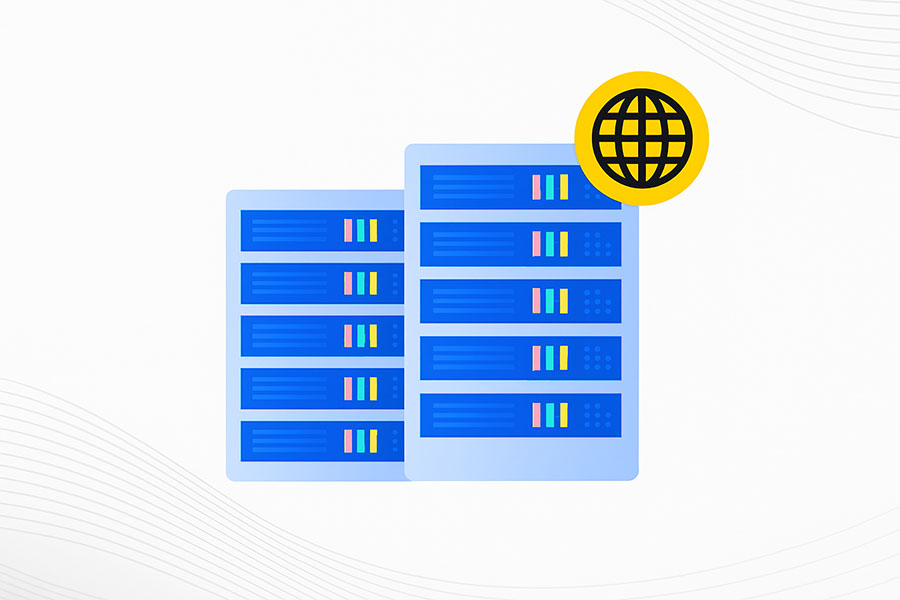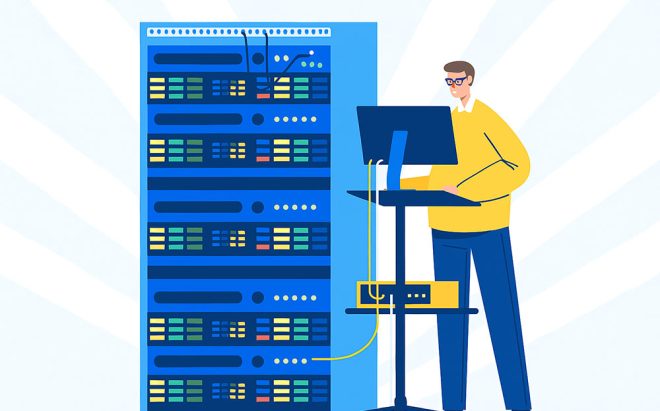In today’s fast-paced and competitive digital world, stable performance, high security, and uninterrupted service delivery are three fundamental pillars of success for any online business. To achieve these goals, a powerful and reliable infrastructure is indispensable. One of the best options for creating such an infrastructure is using a Dedicated Server; a professional and powerful solution for hosting high-volume websites, applications, and online services. In this article, we will take a comprehensive and practical look at dedicated servers, from definition, advantages, and differences to a guide to selection and purchase.
What is a Dedicated hosting service?
A dedicated server is an independent physical server where all its resources (processor, RAM, storage space, bandwidth, etc.) are exclusively available to one user or organization. Unlike shared hosting or virtual servers, where resources are divided among multiple users, with a dedicated server you have complete ownership of the resources and benefit from the highest level of control and customization.
Why Choose a Dedicated Server?
Using a dedicated server is recommended for several reasons:
Exceptional Performance
Since the resources are exclusively yours, you will experience faster application execution, smoother page loading, and better responsiveness to users. This is crucial for high-traffic websites or resource-intensive applications.
Advanced Security
A dedicated server allows you to implement custom security settings, install advanced firewalls, and have complete control over access. This minimizes the risk of intrusion, malware, and data leaks.
Complete Customization
With a dedicated server, you can configure the operating system, software, security settings, and network according to the exact needs of your business.
High Stability and Uptime
By eliminating shared resources, a dedicated server reduces performance fluctuations and provides greater stability. This option is very important for organizations that require near 100% uptime.

Comparing Dedicated Server with Shared Hosting
Shared hosting is one of the most basic and cost-effective hosting methods. In this type of service, the resources of a single server (such as CPU, RAM, and storage space) are shared among multiple websites simultaneously. Although this option is suitable for personal websites, blogs, or small businesses with low traffic, you may experience slowness, limited control, and security vulnerabilities due to resource sharing. To learn more about this type of web hosting, be sure to read the content: What is Hosting?.
In contrast, a dedicated server provides all resources exclusively to one user. This feature results in a much more stable, faster, and secure performance compared to shared hosting. Therefore, using a dedicated server is essential for high-traffic sites or applications that require a lot of resources; even if it costs more than shared hosting.
Comparing Dedicated Servers with Virtual Private Servers (VPS)
A Virtual Private Server (VPS) is a mid-range solution that strikes a balance between cost and features. In this model, a physical server is divided into multiple virtual machines, each with its own operating system and resources. Each user has more control compared to shared hosting and can install software and customize settings. To learn more about VPS, be sure to read the content What is a Virtual Server?.
However, VPS resources are still virtually derived from a main physical server, and performance may fluctuate during peak traffic conditions. A dedicated server does not have this limitation because all hardware resources are dedicated to a single user. Therefore, if you have a project with a high processing load or high sensitivity, a dedicated server is a better option in terms of power and stability, although it is more expensive.
Comparing Dedicated Servers with Cloud Hosting
Cloud hosting has a different structure. In this model, multiple servers are connected in a cloud network, and the processing load is distributed among them. The prominent features of cloud hosting are high scalability and pay-as-you-go pricing. If you need more resources temporarily or dynamically, the cloud system can easily provide them.
In contrast, a dedicated server has fixed resources, but it gives you complete control, greater security, and more stable performance. Cloud hosting is suitable for startups or apps that need rapid growth and flexibility, but if your priority is security, stability, and complete ownership of resources, a dedicated server is a more reliable choice.
Comparison Summary
| Feature | Shared Hosting | VPS | Cloud Hosting | Dedicated Server |
| Hardware Resources | Completely Shared | Virtual and Limited | Distributed and Scalable | Completely Dedicated |
| Level of Control | Very Low | Medium | Medium to High | Complete |
| Security | Low to Medium | Medium | Good | Very High |
| Stability and Speed | Low to Medium | Medium | High | Very High |
| Price | Low | Medium | Variable (depending on usage) | Relatively High |
| Suitable for | Simple Websites | Growing Websites | Scalable Projects | Professional, High-Traffic, and Sensitive Websites |
Types of Dedicated Server
Dedicated servers are divided into three main categories based on the level of management:
- Managed Dedicated Server:
Software management, updates, backups, and monitoring are performed by the hosting company. Suitable for individuals who do not have technical knowledge or do not have enough time to manage the server. - Unmanaged Dedicated Server:
The user is fully responsible for setting up, maintaining, and managing the server. Suitable for developers, technical companies, or teams with high expertise. - Semi-Managed Dedicated Server:
A combination of the two above. Part of the management responsibilities are the responsibility of the hosting company, and the rest are at the user’s disposal.

Who Needs a Dedicated Server?
- High-Traffic Websites: Such as news portals, large online stores, social networks, and reservation systems.
- Professional Online Businesses: Banks, cryptocurrency exchanges, financial systems, government organizations.
- Developing Startups: Especially those experiencing rapid growth and requiring high scalability.
- Developers and Software Companies: For testing and running sensitive or resource-intensive applications.
Dedicated Server Purchase Guide
Before purchasing a dedicated server, consider the following points:
- Processor (CPU): For faster performance, use multi-core models such as Intel Xeon or AMD EPYC.
- RAM: A minimum of 16 GB is recommended for heavy usage. Specific applications may require 64 GB or even 128 GB.
- Storage Space: Using SSD instead of HDD increases read/write speeds and faster loading times.
- Bandwidth: Should be selected according to the traffic volume of the website or application. For large projects, unlimited or high bandwidth is recommended.
- Technical Support: Be sure to choose a company that has 24/7 support and a fast response time.
- Data Center Location: The closer the data center is to the end-users, the lower the latency and the higher the speed.
For businesses targeting European markets or requiring low-latency connections to Europe, choosing a dedicated server in strategic European locations is crucial. HiData offers Europe dedicated servers hosted in Germany and Finland through Hetzner’s premium network infrastructure, providing exceptional connectivity and performance. These servers feature next-generation Intel and AMD processors, unlimited monthly traffic, and full root access, making them ideal for businesses that need reliable hosting with European data privacy compliance and minimal latency to European users.
Conclusion
A dedicated server is a professional choice for organizations, large online stores, high-traffic platforms, and software companies looking for fast performance, high security, and complete control over their infrastructure. If your business requires powerful resources and guaranteed uptime, a dedicated server can be a long-term investment for sustainable growth. Before purchasing, carefully consider your technical needs, budget, and the provider’s support services to make the best choice.
Frequently Asked Questions
1. Is a dedicated server suitable for small businesses?
In most cases, small businesses do not need a dedicated server; however, if you are experiencing rapid growth or need high resources, it can be a suitable option.
2. Is it possible to upgrade dedicated server resources?
Yes, most companies offer the ability to upgrade the CPU, RAM, storage space, and even bandwidth.
3. What is the main difference between a dedicated server and cloud hosting?
A cloud server uses multiple servers to distribute the load and offers high scalability. However, a dedicated server provides more stability, security, and control.
4. Who are the best dedicated server providers?
Companies like HiData, OVH, Hetzner, Google Cloud are among the most reputable providers globally.
5. Looking for a Reliable Dedicated Server in Europe?
If your business requires high-performance dedicated servers with excellent connectivity to European markets, explore HiData’s Europe dedicated server solutions. With data centers in Germany and Finland, unlimited traffic, and 24/7 expert support, you can ensure your applications run smoothly for your European audience.
